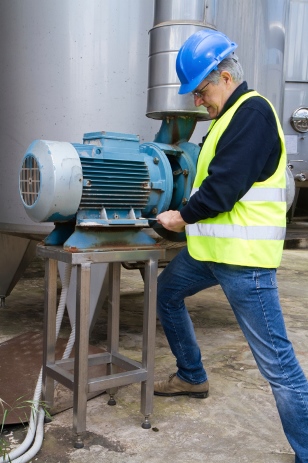Jobs for the Next Wave of Machinists
 The perception that the petrochemical and manufacturing fields have hazardous, gritty work environments where employees churn out repetitive, monotonous work could not be farther from the truth nowadays. Both of these technology-driven fields are flourishing – and providing high-paying jobs in safe, clean working environments – making the need for skilled workers such as machinists even more critical.
The perception that the petrochemical and manufacturing fields have hazardous, gritty work environments where employees churn out repetitive, monotonous work could not be farther from the truth nowadays. Both of these technology-driven fields are flourishing – and providing high-paying jobs in safe, clean working environments – making the need for skilled workers such as machinists even more critical.
Machinists set up and operate a variety of powerful tools that are either computer-controlled or mechanically-controlled in order to produce accurate metal parts, instruments, and tools for engines and other automated products. As industries such as petrochemical and manufacturing experience surges, it’s vital to train future machinists to help keep jobs in the United States, which in turn benefits our economy.
The job outlook for machinists is favorable. The U.S. Bureau of Labor Statistics has forecast the demand for machinists to increase about 7 percent, adding about 29,000 jobs, through 2020. One of the reasons for the growth is because many employees who occupied machinist jobs are retiring, and machinist jobs will need to be filled by new, trained specialists.
In states such as Texas, the oil and gas sector is driving the demand for skilled workers, particularly in areas such as Houston, where the petrochemical industry is facing a shortage. While jobs are available for machinists in the Houston region, employers are having a difficult time finding people who possess the advanced skills and understanding of machining technologies to fill these positions. To help equip students with the training needed for these jobs, the member schools of the Texas Gulf Coast Consortium of Community Colleges offer high-quality, affordable instruction regarding machining and other subjects that will prepare them for their careers with a two-year Associate Degree.
The Skills of a Machinist
Petrochemical and manufacturing companies make substantial investments in their equipment. A team of machinists will be responsible for operating various pieces of equipment. Therefore, it’s essential that machinists are team players with good communication skills. While a machinist doesn’t need to have a four-year degree, they should possess math and science skills. Machinists typically carry out the following duties:
- Review and work from blueprints, computer-aided design (CAD), and other materials
- Set up and operate various tools including computer numerical control (CNC) tools
- Turn, mill, drill and grind machine parts to certain parameters
- Plan and troubleshoot the production process
- Oversee the feed and speed of machines
- Examine and test completed products for accuracy
Machinists use a variety of tools (either manually controlled or CNC) such as lathes, milling machines, and grinders to produce precision metal parts. There will be a projected 18,775 jobs available in 2016 for machinists in the Houston region. The median hourly pay for machinists is $19.64.
The machinist trade is continually evolving, so machinists will need up-to-date training. Member schools of the Texas Gulf Coast Consortium of Community Colleges offer reputable academic programs that will pave the way for the next generation of successful machinists.
